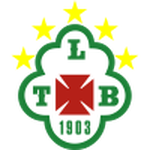| Coach | NA |
| Venue | Estádio Francisco Vasques |
Tuna Luso predictions
Predictions for Tuna Luso: See upcoming and historic predictions for Tuna Luso below.
Disclaimer: Past performance does not guarantee future results. Betting involves risk; only wager what you can afford to lose. Always gamble responsibly.
Tuna Luso latest results
About Tuna Luso
Tuna Luso Brasileira is a traditional football club based in Belém, Pará, Brazil. Founded on January 15, 1903, the club has a rich history that spans over a century. The club's name, Tuna Luso, is a tribute to its Portuguese roots, with "Tuna" referring to a group of university students who play music and "Luso" signifying the club's connection to Lusophone or Portuguese-speaking countries.
Tuna Luso's journey in football began in 1914, and since then, the club has made significant contributions to Brazilian football. The club's colors are red and white, and its mascot is a dolphin, which is a common species in the Amazon River.
Tuna Luso has had its fair share of successes over the years. The club has won the Campeonato Paraense, the top football league in the state of Pará, ten times, with the most recent victory coming in 1988. The club also had a remarkable run in the Série B, the second tier of Brazilian football, in 1985, finishing as runners-up.
Despite these successes, Tuna Luso has also faced challenges. The club has spent much of the 21st century in the lower tiers of Brazilian football. However, its commitment to nurturing local talent and promoting football in the region remains unwavering.
The club's home ground is the Estádio Francisco Vasques, also known as the Souza. With a capacity of over 8,000 spectators, the stadium has been the site of many memorable matches and has played a significant role in the club's history.
Tuna Luso's impact extends beyond the football pitch. The club is also known for its social and cultural activities, including its involvement in the annual Carnival celebrations in Belém. The club's samba school, Tuna Luso Comercial, is one of the most successful in northern Brazil and has won numerous titles.
Despite the ups and downs, Tuna Luso remains a beloved institution in Pará and a symbol of the region's passion for football. The club's rich history, commitment to local talent, and vibrant cultural activities make it a unique and important part of Brazilian football.
















